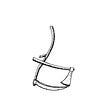The Czech Lindy Hopping Menace Vita has decided to bless us with another essay. This one is about AI- which is admittedly such a hotly debated and ubiquitously talked about subject at the moment.
In lesser hands such a topic could be tediously cliche but fortunately our man Vita talks a lot of sense and doesn’t get lost amid the hype and the noise. He reminds us to focus on our humanity, which is always good advice.
Enjoy.
The more AI tools do for us, the more onus is on us to figure out what we actually want to do. Or not figure it out, of course, and just scroll feeds and watch fail compilations.
That’s the plight of modern times.
Now, you could tell an AI tool to figure out what to do with your life for you. You could feed your CV into ChatGPT and IRL become the agent of AI.

I don’t know about you, but that idea doesn’t appeal to me much, beyond some initial curiosity. While AI might be able to generate some options for me, I want to be the one to decide with my NI (natural intelligence, such as it is) what action to take. I want to use my AI-Free will.
And so, the onus is still on me to figure out what to do. But what does that actually mean? How to decide what to do?
I see 2 main parts of the process: narrowing down choices and committing to one at any given moment.
Choice and commitment = struggle of our times
Narrowing down the options and committing to one are already key skills in today’s era, and will become even more important with more and more AI tools.
And here’s the thing: both of these skill rely on self-knowledge.
This knowledge is not something that modern AI tools can spit out with accuracy, if not thoroughly trained with a bambillion data points on ourselves. Data which I do not care to collect and do not care to feed into the machine. (If you do, good for you. Sounds like a fun experiment.)
So if I don’t put everything I can articulate about myself into the machine, what do I do?
Know thyself, 21st century edition
This is what it comes down to.
What do you want to do? What do you enjoy? What can you offer to the world that someone might be willing to pay for?
The answers to those questions are more relevant than ever, and yet, how many of us bother to take the time to reflect on them in writing, on a walk, or just staring out of a window on a train? Not many - that would be my guess.
The promise of technology in general is that we can be more productive in less time. More output for less input.
So as we can do more and more with less work, we should spend more time thinking about what that work should be. We should be engaging in creative synthesis: brainstorming, mulling over options on walks, converging on best options through discussion,…
However, if we instead take that now-free time and get stuck in feeds of one sort or another, we won’t know what to do and so we won’t have any commitment to follow through. That is the danger of endless online entertainment - something I’ve written about extensively elsewhere.
Here, I will simply say this:
AI generally won’t help you choose and commit, that’s on you.
You are the one who can narrow down options, pick one, and follow through. You are the captain of the ship. You choose your destination.
And to accomplish that, I will provide a simple heuristic. In my experience, having everything at your fingertips can be unhelpful, because there are so many simple luring choices—tap an icon and watch videos for hours—so instead:
When you don’t know what to do, go away from screens.
This simple rule will help you figure out what to do and what to commit to, because it will lead you to ask yourself questions and find your own answers, not just get a generic reply to a prompt. Once you’ve done the hard part, then go and do the work, using all the tools you want, AI or otherwise.





Couldn't agree more with this.
Amen to this one: when I get bummed about the digital world, I go for a walk or a bike ride or I work in the garden or I just go out and fiddle in my garage again, for the umpteenth time, and it all sorts itself out. Now, putting down the screen ...